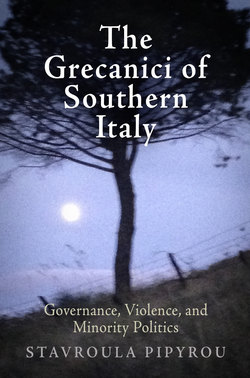The Grecanici of Southern Italy

Реклама. ООО «ЛитРес», ИНН: 7719571260.
Оглавление
Stavroula Pipyrou. The Grecanici of Southern Italy
Отрывок из книги
The Grecanici of Southern Italy
Governance, Violence, and Minority Politics
.....
Domenico is hardly alone in articulating his claims to difference through victimhood as often Grecanici civil society appropriate buried histories in order to “authorise contemporary moral and political claims” (Ballinger 2003:14). Nevertheless, narrating victimhood has a rhetorical potential (Carrithers 2005). In the same manner that the trope of victimhood provides a framework to articulate bitterness and dissatisfaction about the past, it provides scope for future possibilities. In their seminal volume on social suffering, Arthur Kleinman, Veena Das, and Margaret Lock have argued that cultural responses to the traumatic effects of political violence often transform the local idioms of victims into universal professional languages of complaints and restitution—and thereby remake both representations and experiences of suffering (Kleinman et al. 1997:x). Narratives of victimhood have rhetorical potential that is performative and thus constitutive of difference. The intense interest surrounding the Grecanico language and culture over the past fifty years has formed a pool of “trained Grecanici” who are readily disposed to the rhetoric of victimhood and represent the public face of the minority. These people have mastered techniques and languages of global governance, and such is their competence that it has come to shape a particular social aesthetic among the population (Cavanaugh 2009:6).6 Gradually developed into a pervasive tool of governance by Grecanici civil society, it targets national and international policies for linguistic minorities. Gone are the days when Grecanici needed to suppress their language out of fear of discrimination; to claim that they have entirely disposed of the stigma of the second-class citizen would not be true, but for those with “official” training the language that once brought them shame now brings recognition.
Recognition came after many decades of struggle as linguistic minorities increasingly played an important role in local and national politics (Salvi 1975; Albano-Leoni 1979; Cavanaugh 2009), cumulating with the controversial Law 482/19997 promising promotion and protection of languages covered by the law (Coluzzi 2007:57–58; Prato 2009; Dal Negro and Guerini 2011). Classified by UNESCO as severely endangered, it is the notion that the Grecanico language is distinctive and rich yet “in danger of extinction” that mobilized national and international organizations to approach Grecanici as people rather than a linguistic “anomaly.” Since the 1970s the Association Internationale pour la Défense des Langues et Cultures Menacées (AIDLCM), argued that Grecanico “could enrich everybody … the loss of which would be irreparable … and constitutes a part of the heritage for which Italy is responsible.” In 1975, AIDLCM claimed that “the Greek culture of Calabria lives its last decade … the last Greek shepherds live their last humiliation. The Greek community of Calabria constitutes an island colonized economically and culturally, in a region itself underdeveloped and colonized … a fact for which the Greek community is not responsible. To leave things as they are at the moment … would be to bear the burden of a real cultural genocide” (AIDLCM 1975; quoted in E. Nucera 1984/5:41).
.....